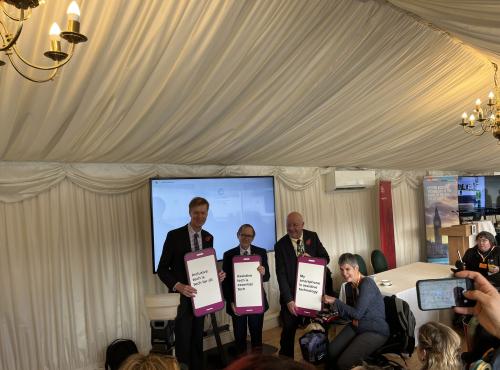A Manufacturing, Design & Innovation Policy Manifesto from Policy Connect
Policy Connect publishes its Manufacturing, Design & Innovation Manifesto for the General Election 2017.
Produced by the organisation’s Manufacturing, Design & Innovation Team, and comprising the expertise of five different independent policy research groups, our groups consist of cross-party parliamentarians and cross-sectoral industry experts.
Based on our work, these should be the priorities in Manufacturing, Design & Innovation for the new Government:
1. Continue to develop an Industrial Strategy that encompasses technical skills
Manufacturers widely welcomed the government’s new focus on developing a comprehensive, strategic, long-term Industrial Strategy which both fosters innovation and growth in UK industry but also clearly defines the government’s role in this complex task. A particularly important aspect of this strategy proposed by the government in its Green Paper was the prioritisation of technical and applied education and skills across all age ranges. This was welcomed by manufacturers who consider closing the skills gap to be a priority.
A number of our APPGS submitted reports to the government consultation on the Industrial Strategy, welcoming the green paper and making recommendations on future development.
2. Negotiate a comprehensive post-Brexit EU-UK trade deal
The withdrawal of the UK from the European Union presents many challenges for British companies, but the changing nature of our relationship with our biggest trading partner is one of the biggest. Many companies sell to, buy from, or collaborate with Europe, and this is unlikely to change for the foreseeable future. The future government must prioritise the negotiation of a trade deal with the EU which prevents reverting to World Trade Organisation tariffs, and maintains stability for trading including European standards and regulations. The importance of the EU customs union in removing non-tariff barriers to trade must also be acknowledged in the negotiation.
Our Manufacturing Policy team made a significant submission to the ‘Exiting the EU’ Select Committee inquiry on negotiating priorities around Brexit. This focussed on the three areas manufacturers have significant concerns; people & skills, markets & trade, and regulations & standards.
3. Plan for the economy of the future by developing digital and data skills provision
Over the coming 25 years it is anticipated that the way we work will fundamentally change. The 4th industrial revolution – the uptake of digital and data-driven technologies – is set to fundamentally alter manufacturing and many diverse sectors of the economy. We recommend that the next government look strategically to the future needs of industry and business and ensure that data and digital skills education is developed today, to ensure the country is prepared for the future. This must also include re-training and upskilling for older workers already in the workforce whose jobs may fundamentally change as new technologies develop.
Our Data Analytics Policy team made a submission to the BEIS Industrial Strategy consultation on the topic of data skills in the industrial strategy, laying out how to build data skills provision, upskill existing workers, and identifying particular existing skills gaps. Our Manifacturing Team also highlighted some of these topics around digital manufacturing in Industrial Strategy submission.
4. Improve the quality of the built environment by developing new links between government and the private sector
The new Government should seek to improve the nation’s homes, workplaces and open spaces by adopting a ‘design-first’ approach to architecture and construction projects. The built environment plays a major role in developing communities. It also affects health, productivity, and the environment. Government can seek to improve matters further by developing stronger links between Whitehall and the Town Hall, and giving local authorities the powers and resources to engage with private sector builders.
The Design Commission’s People and Place: Design of the Built Environment and Behaviour report calls on central government, local authorities and the private sector to step up in the wake of the housing crisis, social cohesion and better living space planning. The document focussed on four areas, healthy behaviours, productive behaviours, socially cohesive behaviours and environmentally sustainable behaviours, as well as efforts to solve Britain’s housing crisis.
5. Develop a tax system that rewards innovation and allows micro-businesses to thrive
Britain’s design sector is a powerhouse, feeding into all areas of the economy and contributing greatly to economic growth and soft-power. The new government should continue to reward innovation by expanding the reach of research and development tax credits, improving access to finance for small businesses, and ensuring that assistance is given to new entrants to the marketplace as well as to established firms.
Our Design Policy Team contributed to the Autumn Statement call for evidence in December, winning a significant concession on a review into the future of R&D Tax Credits. This now forms part of the work being undertaken by Innovate UK to grow businesses working with new ideas and technologies.



